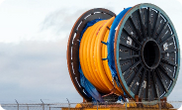Guest Post by John Hamlin

Types of Thermocouple
The types of thermocouples are determined by the kind of alloys used to produce their wires. With this, the material for the wire depends on the range of temperatures to be measured, their mechanical properties, and the environment they will be exposed to. The three types of connections for thermocouples are exposed, insulated (ungrounded), and grounded. Below are short descriptions of the types of the thermocouple.
1) Exposed junction
Exposed junctions have two joined conductors exposed externally from the thermocouple sheath. They react quickly with the slightest temperature change, but they are easily damaged. Exposed junction thermocouples are best used in applications where fast response applications and minimal damage risks to the sensor.
2) Grounded junction
These types of thermocouple junctions are the most common connection. Grounded junctions have two conductors welded with the external sheath -this forms a sealed junction. The thermocouple is not electrically insulated and may get interfered with by other potential EMF. Grounded Junction thermocouples are used in corrosive environment applications.
3) Ungrounded junction or insulated
Unground junction types are fully insulated from the external protective sheath. Their insulation protects the sensors from any effects caused by external EMF’s. The reaction time for this type of thermocouple is slower than the exposed types. These are used in applications where sensitive electronics are needed to be protected from feedback voltages.
Applications of Thermocouples
These temperature sensing devices have a wide range of uses because of their capabilities and low-cost possibilities. Thermocouples are seen in electronic power generation, furnace monitoring, consumer electronics, industrial processes, food processing, automotive sensors, spacecraft, aircraft engines, and many more.
The advantages of these devices make them perfect for temperature control and measurement -these include small size, fast response, and the ability to endure shocks and vibrations. Described below are the short descriptions for the common thermocouple applications.
Thermocouples supply accurate readings immediately, making them the perfect temperature reading device for the food industry. The food industry has extensive temperature measurement demands because these are required in different phases of food production. The thermocouple used in this industry is a two-piece unit consisting of a handheld readout and a detachable probe. The tip of the probe has two wires connected together. These probes can measure either surface or air temperatures.
Extruders are perfect for high temperature and high-pressure applications. The sensor tips can withstand the high temperature and pressure of molten materials. The thermocouples for this application are directly incorporated into the processes. These units have a high degree of accuracy added with a quick response time.
The function of a thermocouple is to shut off the gas when it is not sensing a flame. This device serves as a safety accessory that prevents the furnace from filling out gas when the pilot flame is out.
Thermocouples for molten metals are used to measure temperatures of up to 1250 degrees Celsius. They are necessary for controlling and monitoring the liquid metals during the processes of melting, holding, degassing, and casting.
The function of a thermocouple in gas appliances is to relay the signal to the gas valve when the pilot is lit. The thermocouple is placed between the pilot flame to be able to detect the heat and generate the necessary voltage to maintain gas flow. When the flame is out, the voltage will disappear and will close the valve.


















